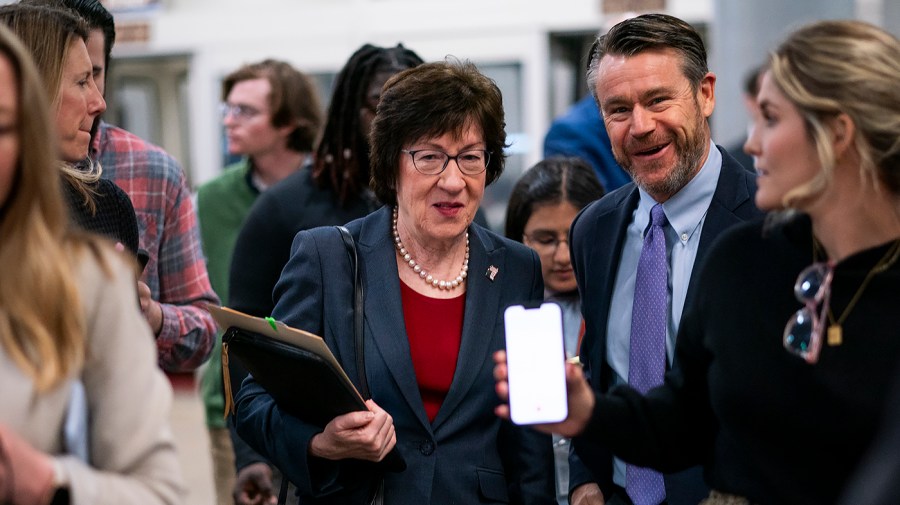
The Senate voted overwhelmingly in the early hours of Saturday to pass legislation to boost Social Security benefits for more than 2 million Americans.
The legislation will repeal two statutes that have reduced payouts to state and local police, firefighters, teachers and other public sector workers and their spouses for years.
The legislation passed by a vote of 76-20. President Biden is expected to sign it into law.
Sen. Susan Collins (R-Maine), the bill’s sponsor, said it would address “horrendous inequity.”
She highlighted the plight of teachers in Maine who worked their whole careers in the public sector under a state retirement system that did not include Social Security and as a result received a fraction of the Social Security benefits earned by spouses who worked in the private sector after they died.
Collins has been working on the issue for more than 20 years, and first introduced the bill in 2005. The bill will help more than 20,000 people in her home state.
Sen. Bill Cassidy (R-La.) talked about his former high school civics teacher, Ms. Betty, who saw her husband’s Social Security benefit cut to a fraction of what she expected because she spent her life working in public schools.
“When her husband passed away, her husband worked at [an] Exxon refinery … her social security was cut to a fraction because she had worked in the public sector as a teacher,” he said.
Cassidy said his former teacher would have received better benefits in retirement “if she had never worked at all.”
The legislation will increase benefits for more than 70,000 people in Louisiana.
The bill, the Social Security Fairness Act, will repeal the Windfall Elimination Provision (WEP), enacted in 1983, which reduces the Social Security benefits of workers who receive government pensions not covered by Social Security
It will also repeal the Government Pension Offset, enacted in 1977, which reduces benefits for spouses, widows and widowers whose spouses receive public sector pensions.
Sen. Sherrod Brown (Ohio), the bill’s Democratic sponsor, said the legislation would help bus drivers, teachers and cafeteria workers in the public schools system.
He talked about a woman who drove a bus for disabled children in Lawrence County, Ohio, for 40 years whose Social Security benefits would be reduced from $2,100 a month to $500 a month under current law.
The Congressional Budget Office projects the legislation will add $196 billion to the federal deficit over the next 10 years and speed up Social Security’s projected insolvency by six months.
Senators passed the measure after defeating an amendment sponsored by Sen. Rand Paul (R-Ky.) to offset the cost of the expanded benefits by gradually raising the retirement age from 67 to 70 over 12 years.
“If we give new people more money, we have to take it from somewhere. We have to either borrow it or print it, but it has to come from somewhere,” Paul said.
“You can’t just push the bankruptcy of Social Security and say, ‘Well, yeah, it will go bankrupt in about nine years but maybe I won’t be here,” he said. “Shouldn’t we care about the future of Social Security.”
Paul said the vote on his amendment would reveal “who are he truly fiscally responsible people in the Senate.”
Sen. Mike Lee (R-Utah), another fiscal conservative, argued that WEP was enacted to “fix serious problems in how Social Security benefits were calculated,” asserting that prior to it individuals with mixed careers in the public and private sectors often received more in Social Security benefits than they were entitled to receive.
He acknowledged that the laws designed to keep people from receiving more than they earned in benefits may have needed to be finetuned but argued that repealing WEP and GPO altogether would return the nation to “a broken model that unfairly rewards some at the expense of others.”
He argued the bill would “force” the 96 percent of the workforce that contributes to Social Security to “subsidize overly generous benefits for the 4 percent of the workforce, those who do not participate in social security and instead contribute to noncovered pensions.”
Edward Kelly, the general president of the International Association of Fire Fighters, applauded passage of the bill.
“Congress broke a promise 40 years ago to millions of Americans when it enacted the Windfall Elimination Provision and the Government Pension Offset,” Kelly said. “Today, U.S. senators from both parties joined to right that wrong, ensuring that retired fire fighters and other dedicated public servants get the Social Security benefits they’ve paid into and earned.”
The legislation passed the House last month by a vote of 327 to 75.












